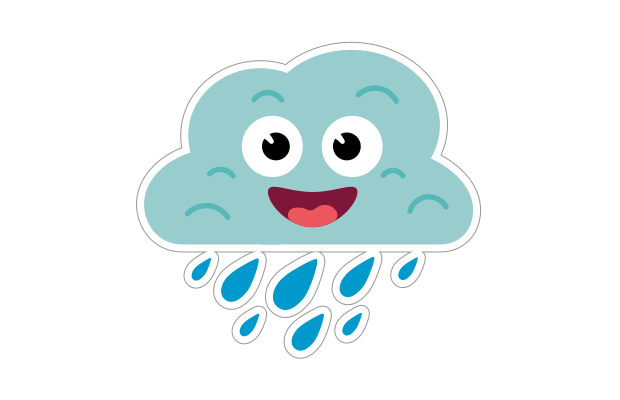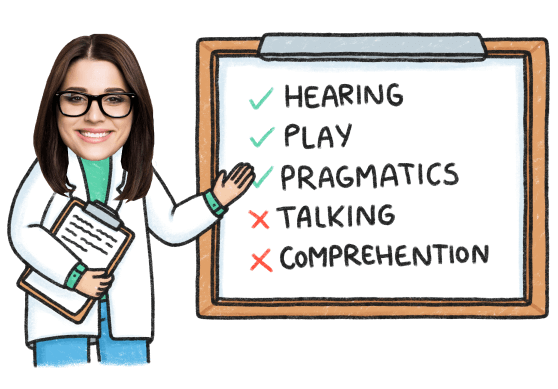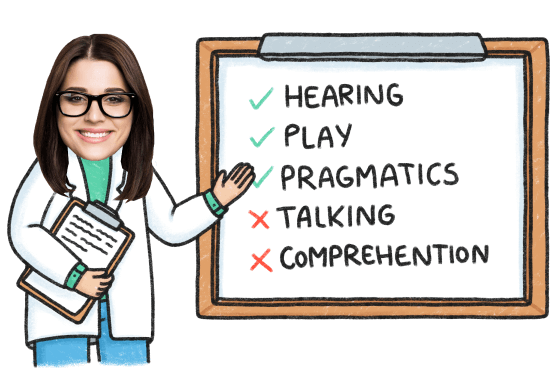Causes for Autism - Genetics, Toxins and More
Jan 16, 2022 Do you know the causes of autism? For years, many believed the root cause of autism was vaccines. However, with recent research, the theory of vaccines causing autism has been debunked.
Now science believes there is no one single cause to autism. Instead, it’s believed environmental and biological factors influence the development of autism. Although many factors influence development, the following seven factors are thought to cause autism.
1. Autism Runs in the Family
Genetics plays a significant role in the likelihood of developing certain conditions. The same is true for developing autism since family members carry the same genes. However, sharing the same genes still doesn’t guarantee someone will develop an autism spectrum disorder.
The risk of having a child with autism is 1 in 68, which is only a 1.5% chance. But, if a family already has a child with autism, the risk of having another child with autism increases by 20%. Autism is also 2-3 times more likely to be diagnosed in boys than girls.
In a family unit of two or more children with autism, the risk of having another child with autism increases to an astounding 30%.
On top of the risk of autism increasing with siblings, researchers found links between the risk of autism and a family history of brain conditions. A Swedish research study examined over 500,000 children with and without autism, plus their relatives and their relatives’ diagnoses.
The results of this study showed that children with a sibling or parent with a brain condition had a 4.7 times greater risk of developing autism, and a 7.6 times greater risk of having both autism and an intellectual disability.
Other studies have found similar results. The risk of autism increases if a sibling has attention deficit hyperactivity disorder (ADHD) or a parent has depression, anxiety, bipolar disorder, and schizophrenia.
2. Birth Complications
A study from the American Journal of Perinatology found children who experienced complications before or during birth were at an increased risk for developing autism. From this same study, the birth complications found to be at the highest risk of resulting in autism include:
- Birth asphyxia (oxygen deprivation during birth)
- Preeclampsia
- Separation of the placenta from the uterus
- Breech or transverse birth
- Prolapsed or exposed umbilical cord
My son is going through the process of being diagnosed with autism, and I can’t help but think that birth complications are a likely factor contributing to his diagnosis. He experienced birth asphyxia and had to be resuscitated, plus fend off a viral infection for six days in the hospital immediately after birth.
3. Genetic Disorders
Since genes play a major role in the risk of developing autism in families, certain genetic disorders also raise the risk of autism. For some children, autism develops in the womb due to genetic mutations.
For other children, two genetic disorders are identified as a risk factor for Autism Spectrum Disorder:
- Fragile X Syndrome – A condition affecting the X-chromosome causing developmental disabilities and cognitive impairment.
- Rett Syndrome – A neurological disorder causing severe movement disability.
Boost Your Child’s Speech Development!
Improve language & communication skills with fun learning!

4. Born To Older Parents
There have been multiple studies in Israel, Denmark, Sweden, and California that found men over the age of 40 had a six-fold increase of having a child with autism.
While this may seem like a significantly increased risk for men over 40, research studies yield different results. The studies’ conclusions vary so widely that by looking at all the studies conducted on advanced age and autism there’s not a conclusive risk percentage. It varies between a 5% to 400% increased risk of a child having autism if the father is over 40.
Although it cannot be ruled out as a significant cause of autism, the risk of a child developing autism with a father over 40 years old can’t be ruled out as a contributing factor. It is suspected by researchers that older men may carry autism traits which leads to delays in finding a romantic partner. However, this is simply a hypothesis with no current research to support the theory.
5. Low Birth Weight
A baby is of low birth weight if he or she weighs 5.5 pounds or less. Extremely low birth weight is anything less than 2 pounds, 3 ounces. When a baby is born at a low birth weight or is born prematurely, they lack the proper fetal growth needed for development.
A study conducted by the Center for Disease Control examined birth records in the Atlanta area from 1986 to 1993. These birth records showed children born under 5.5 pounds were at a 2.3 fold increase of autism. It was also found that girls born at a low birth weight were at a 3-fold greater risk of developing autism.
This is an interesting study because typically the risk of autism is higher in boys compared to girls. But this CDC study found differences between autism cases in boys and girls. Further research needs to be conducted to find more connections between low birth weight and boys versus girls.

6. Heavy Metal and Environmental Toxin Exposure
Thanks to scientific research, pregnant women can avoid certain toxins known to cause harm to a developing fetus. We as a society (especially pregnant women) are much more health-conscious and aware of environmental toxins today.
However, environmental toxins still exist! Sometimes pregnant women do not know they are pregnant, or that they’ve come in contact with toxins.
With so many toxins that exist in the world, which toxins cause autism? An easy answer: Researchers aren’t sure! That’s because many chemicals in use today haven’t been assessed for toxicity.
According to the Children’s Environmental Health Center (CEHC) the following 10 common environmental toxins and chemicals are suspected of causing autism and other learning disabilities:
- Perfluorinated compounds
- Automotive exhaust
- Endocrine disruptors
- Polycyclic aromatic hydrocarbons
- Brominated flame retardants
- PCB’s
- Organochlorine pesticides
- Organophosphate pesticides
- Lead
- Methylmercury
Keep in mind that these 10 chemicals are only suspected of causing autism and learning disabilities. Still, more research needs to be conducted on the above chemicals and toxins.
7. Viral Infections
Research today is pointing to a strong possibility of autism developing before birth. A recent study published in mSphere by the American Society for Microbiology discovered pregnant women with active infections were twice as likely to give birth to a child with autism.
Although we tend to think of viral infections like the common flu strain, the study showed specific groups of viral infections suspected of causing autism. The following viral infections present during pregnancy doubled a women’s risk of having a child with autism.
- Herpes Simplex Virus 1 and 2
- Human Herpes Virus 6
- Rubella
- Measles
- Epstein-Barr Virus
- Cytomegalovirus
Specifically, the study stated that viruses within the herpes family present during pregnancy put a child at risk. But why do viral infections put pregnant women at double the risk of having a child with autism?
Although it can’t be confirmed, it’s speculated a pregnant woman’s weakened immune response to the infections causes inflammation affecting fetal brain development. Viral infections in the herpes family can also cause permanent damage to nerve tissues.
Conclusion
Is there one single cause of autism? No. Instead, research points to both biology and environmental factors in combination that could cause autism. As science pours through statistical data and more research studies are conducted related to autism spectrum disorders, it’s all about finding the “right” combination of factors that directly point to autism development.
Right now, however, science is still exploring to find factors associated with developing autism.
I think society would like to point to one single cause of autism. But it doesn’t work like that. The development of autism is more complex than once thought.
With having a child going through the autism evaluation process, I tend to blame myself and always find myself asking the question, “What did I do to contribute to my son’s autism?” Through this process of autism evaluation, I’m finding the “why” questions are complicated, as is the treatment and management of autism spectrum disorder.
Have a question for our Speech Therapists?


